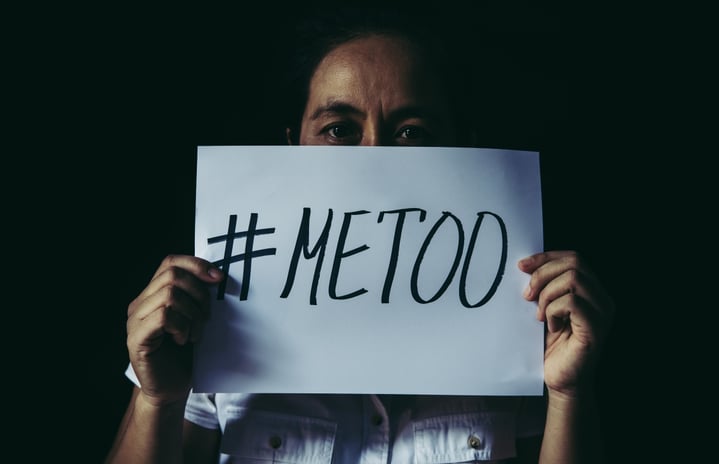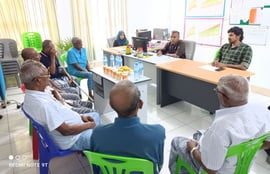“She was planning to leave him when the government issued the order to shut down workplaces and directed everyone to stay home. Caught amidst the coronavirus pandemic and without the financial resources to escape, she finds herself stuck indoors round the clock with her abuser.”
“In another city, thousands of miles away, a woman and two children were wandering the deserted streets of their town trying to seek help. She was just beaten by her former husband and thrown out of the house with their young son and daughter, left to fend for themselves in a city under lockdown."
The first story is that of a domestic violence victim in Philadelphia, USA, and the second, a family in Henan, China. However, there is ample evidence, especially in light of the recently observed January spike in child abuse reporting and statistics such as 1 in 3 Maldivian women having reported experiencing physical or sexual violece in their lifetime, that clearly suggest the incidence of such reports could become rampant here in Maldives too.
As Maldives continues to implement stronger measures in order to combat the spread of COVID-19, Maldivians today find themselves living in unprecedented circumstances. With the shutdown of government offices, all education institutions, fitness and recreational centres, as well as food-and-beverage outlets for an extended period of time, the state has strongly appealed to civilians to stay home for their own safety.
However, a devastating fact often overlooked in times of crisis is that for many people, home is the most dangerous place to be. Orders to stay indoors and isolate can effectively translate into a trap, leaving victims at the mercy of their abusive partners, indefinitely.
Global trends show that the incidence of domestic and gender-based violence spikes during crises such as outbreaks. A prominent example highlighted by the United Nations Population Fund (UNFPA) is the Ebola outbreak in West Africa; the economic impacts of the disease placed women and children “at greater risk of exploitation and sexual violence” from 2013-2016.
Similar paradigms are also present in Maldives. Per the Ministry of Gender, Family and Social Services, reports of domestic violence increase in Maldives during public holidays such as Eid and school breaks - situations where families are often confined to small spaces for long periods.
Speaking with The Edition about the current situation arising from COVID-19, Deputy Minister Fathimath Yumna disclosed that although the gender ministry did not discern unusual patterns immediately after the government declared a state of public health emergency on March 12, they have been receiving more domestic violence-related calls since March 21.
“We have congested households where people with different temperaments are living in close proximity, and all of that can lead to social issues”, she said.
“And women who are stuck with their abusers under the same roof lose their coping mechanisms … If the abuser takes out their anger on the woman, their children are also at risk of abuse and danger.”
“It’s a difficult situation during this emergency,” added Shafeea Riza, co-founder of Family Legal Clinic (FLC), the first Maldivian NGO to provide pro bono legal services to victims of domestic issues.
“The usual escape and support systems for victims of domestic violence are gone. Many of them have no other place to go”, she told The Edition.
Although the stringent measures enforcing isolation and social distancing are undoubtedly necessary to protect the people from the contagious novel coronavirus, it is also crucial for authorities to not allow "side effects" such as rising domestic violence to be overlooked amidst the havoc.
The Deputy Executive Director of the United Nations Women, Anita Bhatia, warned in an interview to ‘TIME' magazine that "the very technique we are using to protect people from the virus can perversely impact victims of domestic violence”, underscoring the importance of recognising that it puts victims at more risk of danger from their abusers.
Various women’s organisations and associations that aid victims around the world have also sounded the alarm. Among the first was China where the virus originated from; the number of cases reported to local police tripled last February, according to China-based magazine ‘Sixth Tone’, which cited the founder of an anti-domestic violence NGO, Wan Fei, that "90% of the causes of violence are related to the COVID-19”.
Similarly, the United States, United Kingdom and several countries across Europe, the new epicentre of the virus, have reported surges in violence as well. One of the most shocking cases was the murder of a 35-year-old mother of two by her partner in Spain last week.
Aid associations state that tense home situations are further exacerbated by the stress caused by confinement and social isolation. While fears surrounding uncertain job security and financial difficulties further contribute to the increasing risk of conflicts, they warn that violence might also crop up in households that previously did not have such problems.
‘How do I get help?'
According to experts, domestic violence comes down to "power and control". With the uncertainties and loss of control evoked during crises such as a pandemic, they noted that abusers feel powerless and take it out on their victims.
Aside from physical and sexual violence, the abuse also manifests in the form of manipulation, such as forbidding victims from leaving the house or contacting families or friends, withholding information about COVID-19, and even threatening to turn them out of the house and expose them to the virus.
The pandemic also poses other challenges besides lockdowns that make victims hesitate to seek help, particularly after violent conflicts.
While some fear going to the hospital over the risk of contracting COVID-19 by doing so, there are also reports of victims refusing to escape to their parents’ or friends’ houses out of fear that they might spread infections.
Moreover, FLC’s Shafeea Riza noted that the state of public health emergency might also deter victims from reporting abuse, over concerns that authorities and healthcare workers were already burdened with the immediate virus situation.
In these trying times, what can someone trapped in an abusive household do?
“Report!” stressed Shafeea, appealing to any and all persons suffering from domestic violence to immediately contact the gender ministry (hotline: +960 3328393) or FLC (hotline: +960 9977771).
“This virus pandemic is not an excuse [for abusers]. Violence is still violence”.
Deputy Gender Minister Fathimath Yumna also assured that the ministry was, even at present, working with relevant authorities to help victims of domestic violence. However, she noted that house visits were a challenge for social workers due to the ongoing emergency, necessitating the gender ministry to primarily operate over phone calls.
"But if there is a serious case involving victims in acute danger, we will work with the police to intervene and bring them under social protection”, she said.
In the same spirit, FLC has dedicated its hotline solely for domestic violence cases for the duration of the public health emergency.
“We are open and offering our services to anyone in need. FLC will advocate on behalf of victims and apply to the court to secure protection orders for them”, said Shafeea.
“FLC's goal is to help those most vulnerable, and deprived of means and access to legal help”, she emphasised. “We are here for the people who need us”.
In the meantime, the gender ministry and FLC have launched a joint social media campaign earlier this month, geared towards promoting positive social behaviour during the emergency, and thus curb the incidence of domestic violence.
“We’re hoping to have a positive impact by promoting healthy communication during times of anger, being kind, smiling and caring for each other during these times”, said Deputy Minister Yumna, indicating the succinct but powerful messages shared daily on the ministry and FLC’s social media platforms.
Listen. Be patient. Be kind. Be loving.
Stressing the importance of fulfilling the civic duty of complying with the measures in place during the emergency, the deputy minister also implored the people to have a positive social outlook.
“We encourage the people to see this as a chance to build healthy familial bonds with their spouses and children by spending time together”.
Meanwhile, several governments and non-governmental organisations around the world are stepping up efforts to protect the vulnerable. Many countries such as the UK operate national anti-domestic violence hotlines round the clock, while the US is funding home-based childcare and contraceptives are delivered to households in Australia. The availability of contraceptives is also in doubt with the spike in use combined with factory shutdowns over the pandemic, which has led to shortages in certain parts of the world. The reduced access to means of protecting one's own reproductive decisions poses an imminent risk to all women, but especially for ones in abusive situations.
In addition to the victims themselves and social workers striving tirelessly to help them, much difference can also be made by another third party - you.
With one in three women experiencing physical or sexual violence around the world, domestic violence is already a “deadly epidemic” that the World Health Organization (WHO) describes as "the most widespread, but among the least reported human rights abuses”.
Now, with another pandemic spreading exponentially across the world and exacerbating the first, being considerate and kind is more important than ever.Be vigilant and do your part in reporting abuse and domestic violence, to fulfil the humane responsibility of raising the voices of those silenced.
Let us all act, not simply seeking to endure the hardship that the health crisis and economic repercussions may bring, but with the intention of becoming the kind of communities that deserve a second chance. Let us not forget the horrifying, tragic series of news that traumatized the entire Maldives just three months ago - the lasting impact of sorrow must be to learn, grow and be better.
For a better tomorrow, together we can and together we must.




